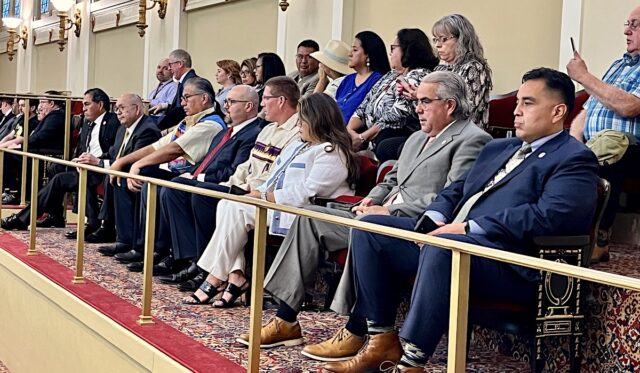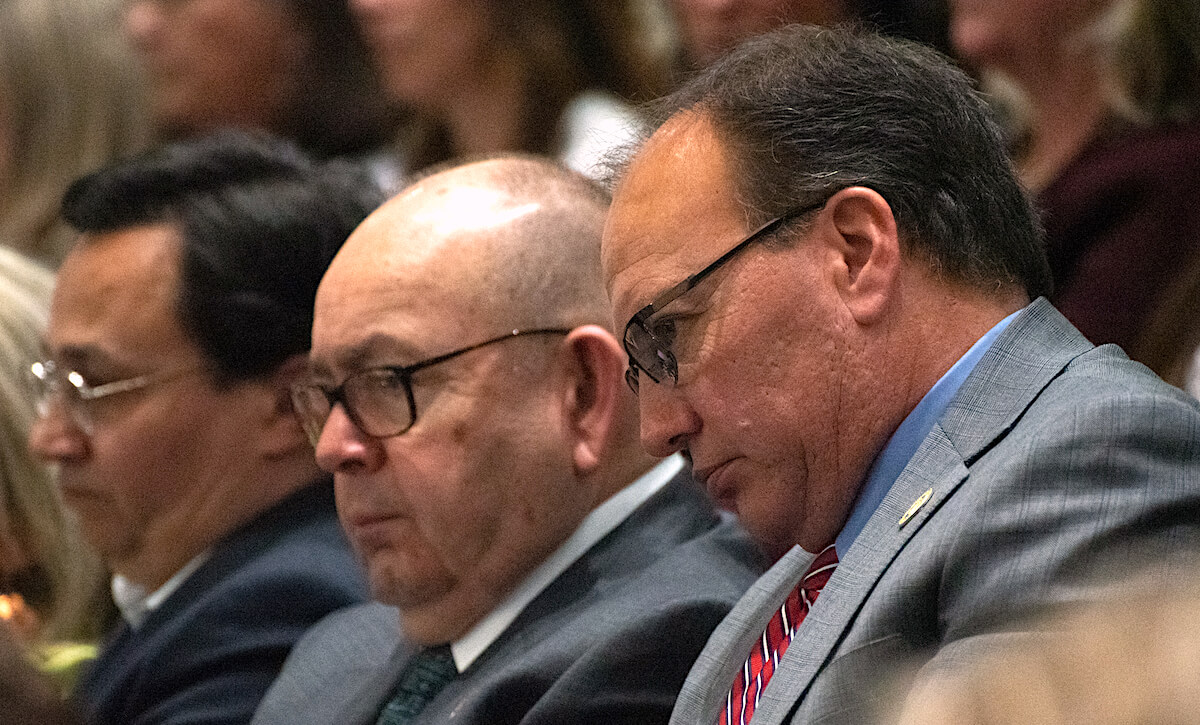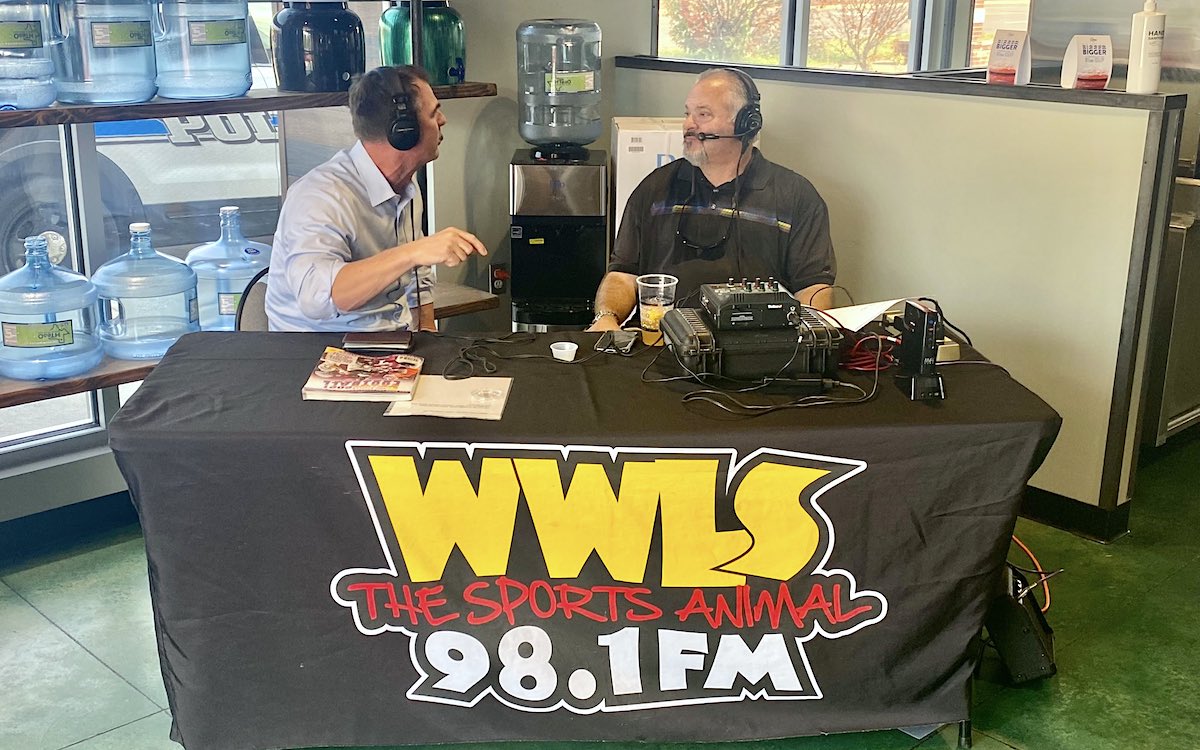
Days after Gov. Kevin Stitt caught legislative leaders off guard by announcing a “plan” to legalize sports betting in Oklahoma, House Speaker Charles McCall is preparing to host an interim study discussion with officials from the state’s four largest tribes on the topic of state-tribal compacts, a subject of enormous tension over the past five years.
Stitt announced his purported plan late Thursday afternoon while he was in Israel, triggering confusion and conversation among lobbyists and legislators who have sought some sort of path forward for years that would allow Oklahoma to legalize sports wagering like more than 30 other states have done since the U.S. Supreme Court struck down a federal prohibition in 2018.
Stitt, who took office in January 2019 and clashed with many tribal leaders later that year when he attempted to renegotiate the state’s Model Tribal Gaming Compact as it approached the end of its 25-year initial term, announced Thursday that his sports betting proposal would allow Oklahomans to place in-person bets at gaming sites operated by federally recognized tribal nations and place bets on mobile devices.
Outlined on a one-page PDF, the governor’s pitch includes an initial $500,000 licensing fee and an annual $100,000 renewal fee for mobile betting operators. His proposal references mobile betting revenue being “taxed” at 20 percent and in-person betting revenue being “taxed” at 15 percent, even though states have no jurisdiction to tax tribal casinos. Instead, as included in the Model Tribal Gaming Compact that a federal court said automatically renewed in 2020, state-tribal gaming agreements can include “fees” paid to states by tribes for “exclusivity” in a gaming market. It’s unclear how Stitt would try to authorize non-tribal sportsbooks while establishing exclusivity fees from tribal sports betting.
Abegail Cave, Stitt’s communications director, said there is “no specific number” of tribal nations with which the governor would support compacts that include sports betting, an industry he has long sought to authorize in Oklahoma. However, Stitt’s new proposal would prohibit prop betting on collegiate student-athlete performance and prohibit bets being made on athlete injuries.
“I promised Oklahomans if we pursued sports betting, we would do it right — and this plan does just that,” Stitt said in his press release. “Thirty-five states have already legalized sports betting, and it’ll be a great revenue stream for the state. Tribes will be able to add it onto their existing infrastructure, and Oklahomans can access it right from their phone.”
McCall study to focus on state-tribal compacts

To accomplish his sports betting plan, Stitt essentially will need to strike a global agreement that convinces the Oklahoma Legislature to legalize sports wagering and persuades influential tribal nations to modify their existing compacts with the state, a pair of feats he has been unable to achieve for years.
In fact, Stitt’s disputes with large tribal nations have spread far beyond casino gambling compacts. Claiming the Cherokee and Choctaw nations were not upholding their portions of what he called bad deals, Stitt refused to reauthorize state-tribal compacts for hunting and fishing licenses in 2021. This year, he attempted to kill legislative bills extending expiring tobacco and motor-vehicle licensure compacts by one year, but lawmakers overrode the governor’s vetoes. More broadly, Stitt and tribal leaders have spent the three years since the landmark McGirt v. Oklahoma decision getting farther apart on potential negotiations for new state-tribal compacts regarding criminal jurisdiction. Even earnest negotiation efforts this summer between Stitt’s office and the Chickasaw Nation on long-term tobacco compact extensions have failed to bear fruit.
Throughout it all, the Republican-dominated Oklahoma Legislature has tended to side with the state’s largest tribal nations instead of Stitt, overriding vetoes and panning the governor’s approach to working with tribes as antagonistic and even “racist.” Along the way, the Chickasaw, Cherokee and Choctaw nations have donated heavily to House Republicans’ Majority Fund political action committee and other PACs.
On Oct. 26, the Legislature’s Joint Committee on State-Tribal Relations met at the behest of Stitt to consider a pair of new casino gambling compacts Stitt signed with small tribes that have lacked gaming agreements. After he signed them in 2020, Stitt sent his new compacts to the U.S. Department of Interior — which deemed them approved by taking no action to halt them — but he did not ask the Legislature to approve them as the Oklahoma Supreme Court subsequently ruled he should have. While choosing not to offer leaders of the United Keetoowah Band of Cherokee Indians and the Kialegee Tribal Town the chance to speak at the Oct. 26 meeting, the legislative committee unanimously voted down the smaller tribes’ compacts, which were opposed by leaders of the Cherokee and Muscogee nations.
On Tuesday and Wednesday, however, House Speaker Charles McCall (R-Atoka) has scheduled an interim study for the House half of the joint committee, where leaders from the Chickasaw, Choctaw, Cherokee and Muscogee nations are scheduled to speak. Although the House’s meeting agenda only specifies “state-tribal compacts” as the topic, a House document obtained by NonDoc shows McCall’s interim study featuring three sessions spanning two days.
From 10 a.m. to noon Tuesday, a “tribal leaders panel discussion and Q&A” is set to feature Chickasaw Nation Gov. Bill Anoatubby, Cherokee Nation Principal Chief Chuck Hoskin Jr., Choctaw Nation Chief Gary Batton and Muscogee Nation Second Chief Del Beaver.
From 1 to 4 p.m., a “tribal attorneys panel discussion and Q&A” is scheduled to feature comments from former federal judge and Choctaw Nation general counsel Mike Burrage, Cherokee Nation Attorney General Chad Harsha and Chickasaw Nation special counsel Stephen Greetham.
The committee is scheduled to reconvene at 10 a.m. Wednesday to hear an “overview and analysis of state-tribal compacts” from University of Oklahoma professor emeritus and Cheyenne and Arapaho Tribes Supreme Court Justice Lindsay Robertson, as well as House staffers Mark Harter and Brad Wolgamott.
Legislative, tribal leaders surprised by Stitt’s sports betting ‘plan’

This week’s meetings of the five-member House half of the Joint Committee on State-Tribal Relations will come only days after Stitt — a member of the Cherokee Nation who has clashed with his tribe’s leadership — surprised lawmakers and tribal leaders with his “plan” to legalize sports betting.
Stitt has pushed the idea since his first year as governor, back when GOP lawmakers generally supported him and enjoyed the sort of friendly relationship that included the governor pranking several legislators during a late-night poker game by sending a state trooper to the door claiming to investigate illegal gambling. According to lawmakers present for the practical joke, Stitt suddenly appeared behind the trooper like Ashton Kutcher on an episode of Punk’d and told the legislators to deal him in next time.
Stitt’s cachet with many Republican legislators has faded since, particularly on the topics of annual budget negotiations and state-tribal relations.
During this year’s regular session of the Oklahoma Legislature, the House advanced HB 1027, which would allow tribes to provide in-person and mobile sports betting. The measure, by Rep. Ken Luttrell (R-Ponca City), passed 66-26 in the House but did not receive a hearing in the Senate. It could be brought up again during the 2024 regular session, which begins Feb. 5.
Sen. Bill Coleman (R-Ponca City) co-authored HB 1027, which would have added in-person and mobile sports betting as a supplement to the Model Tribal Gaming Compact and would have established a sliding exclusivity fee system for what percentage of sports wagering revenue would go to the state.
Coleman said Friday in a statement that he was “somewhat surprised by the governor’s unexpected sports betting proposal given I already have an active piece of legislation.”
“He has never reached out to share his support of the idea or to offer any other input on this important economic development issue,” Coleman said. “It’s frustrating that he didn’t feel it necessary to collaborate with those of us who have been diligently working on this major issue for over a year now, but I’m hopeful that will change in the coming weeks.”
Coleman said he is optimistic that Stitt has shown an interest in bringing sports betting to Oklahoma.
“While the governor’s plan might be a starting point, I’ll be interested to see if he has contacted or worked with our tribal partners to get their input,” Coleman said. “A lack of coordination between the executive branch and tribal leadership was the main reason our bill stalled this session. When dealing with the tribes, compacting, and the many nuances with exclusivity and future gaming negotiations, it’s imperative that Gov. Stitt work in good faith with our tribal partners. I’m not sure he’ll garner much support given his plan, among other things, asks the tribes to give up their online share of sports gaming, which nationally accounts for 95 percent of total revenues.”
Choctaw Nation Chief Gary Batton said in a statement that Stitt, in fact, had not reached out to his office about the topic.
“Many parties, including the Choctaw Nation, have been exploring the potential of bringing sports betting to Oklahoma,” Batton said. “One thing almost everyone agrees on is that this is an extremely complex issue, touching on existing agreements, tribal sovereignty and protecting Oklahoma’s citizens. Unfortunately, the governor did not consult with the Choctaw Nation before announcing his proposal, despite our many years of leadership in operating gaming in Oklahoma and our clear interest in moving the economy forward.”
“Upon initial review, we do not believe the plan represents the best interests for the people of Oklahoma or the tribal nations that have done so much to support the state.”
McCall also said he had not seen Stitt’s plan before it was announced by email.
“As we know from last session, sports betting is a very complicated issue,” McCall said. “The governor didn’t discuss his plan with me before his announcement, and the House will need time to review and discuss his proposal with all interested parties. That being said, the House is always open to good ideas, and I look forward to reviewing his proposal in greater detail.”
Senate President Pro Tempore Greg Treat (R-OKC) had heard rumors of a sports betting proposal, but he wasn’t briefed by the governor’s office ahead of the announcement, according to spokesman Alex Gerszewski. Treat has consistently said he opposes passing a sports-betting bill on its own without a broader examination of state-tribal gaming compacts.
Many hands ahead for weary players

Matthew Morgan, chairman of the Oklahoma Indian Gaming Association, released a statement saying his group also was not consulted by the governor prior to Thursday’s press release about a sport betting plan.
“The members of the OIGA have been preparing to receive an offer from the state on sports betting for the past couple of years, and while we appreciate Gov. Stitt finally joining the sports betting conversation, to date he has not engaged in meaningful and respectful government-to-government discussion with tribes,” Morgan said. “We remain hopeful that he is committed to moving forward in a productive manner in accord with established law and process, which would include working with the Oklahoma Legislature to offer a compact supplement to tribes within the State-Tribal Gaming Act construct that protects the tribes’ ‘substantial gaming exclusivity.’ To approach it otherwise is simply to invite failure.”
Dan Mahoney, vice president of corporate communications for the Oklahoma City Thunder, released a brief statement Friday.
“The Thunder continues to support legal statewide sports gambling in Oklahoma, and we look forward to working with all parties involved to make it happen,” Mahoney said.
Leaders of the Thunder have been interested in creating a sportsbook fan experience center near OKC’s basketball arena similar to those developed in Arizona. While they thought negotiations on sports betting had decent odds this past session, their two-team teaser of necessary legislative approval fell short amid elongated and contentious education negotiations. With wagers on sports betting pushed into next session, Thunder owners sought and received approval for renewal of their corporation’s eligibility for Quality Jobs Act payments.
Now, Stitt has suddenly anted-up in November for a legislative fight brewing for February, and it has left legislators balancing a variety of larger state-tribal relations questions behind the scenes and in public committees.
During the Oct. 26 meeting where lawmakers voted against approving Stitt’s new compacts with the UKB and KTT — which would have authorized new casino locations in Oklahoma and Logan counties — House Majority Floor Leader Jon Echols referenced strong public sentiment toward the legalization of sports betting.
“I just have too many concerns and have heard from too many constituents that my area doesn’t want 15 casinos in Oklahoma City,” said Echols (R-OKC). “They might want one sports book. Maybe a couple. There’s my quote.”





















